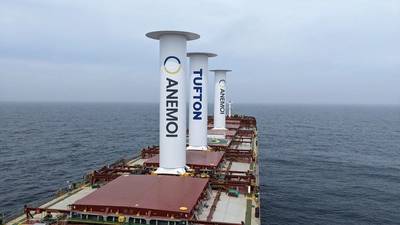Lloyd’s Register Verifies Performance of Anemoi’s Wind Propulsion System
Lloyd’s Register Advisory has verified the performance of Anemoi Marine Technologies’ wind-assisted rotor sails on TR Lady Kamsarmax following a year-long, multi-voyage testing period.
In a Statement of Fact, Lloyd’s Register Advisory confirmed the methodology Anemoi used for calculating fuel and emissions savings from the three 24 meters high Rotor Sails installed on TR Lady - a Kamsarmax bulk carrier owned in funds managed by Tufton Investment Management and chartered by Cargill.
The extensive dataset establishes a reliable and repeatable benchmark for wind-assisted propulsion performance under a broad range of real-world conditions.
During the testing period, TR Lady sailed the Indian Ocean, South Atlantic, North and South Pacific, Southern Ocean and rounded both the Cape of Good Hope and Cape Horn, along with some of the busiest shipping routes, including the Strait of Malacca.
Data from eight consecutive Laden and Ballast legs were analyzed to provide a long-term average of the fuel and emissions savings. The average net savings across this period calculated from the verified performance model were 1.9 tonnes of fuel per day and 7.0 tonnes of CO2 per day (well-to-wake).
This equates to an average of 9.1% net propulsion fuel and emissions savings, according to Lloyd’s Register.
The achieved average savings align closely with Anemoi’s predicted 10% savings, making this a very positive result.
Additionally, since TR Lady does not follow a fixed route, the results varied from voyage to voyage depending on the route taken and the wind conditions encountered.
For example, on a 22-day voyage across the North Pacific, average route savings of 21% net propulsion fuel reduction were calculated from the verified performance model.
Lloyd’s Register Advisory confirmed that the findings of this study validate Anemoi’s approach as a reliable method for calculating Rotor Sail performance.
The Statement of Fact concluded that ‘there is close agreement between the predicted thrust coefficient trends and the measured values’.
“We have independently verified Anemoi’s methodology to calculate thrust power and predict fuel consumption, confirming its accuracy when ship-specific coefficients are correctly applied and kept up to date.
“Our assessment, drawing on high-frequency operational data and CFD analyses for rotor sail-equipped vessels, highlights the value of detailed, vessel-specific modelling. The findings show that wind-assisted propulsion, when supported by robust data and transparent methods, can significantly reduce uncertainty and contribute meaningfully to emissions reduction in commercial shipping,” said Dogan Uzun, Ship Performance Consultant at Lloyd’s Register Advisory and project manager of the assessment.
“This independent verification is a crucial step in building trust across the industry. Lloyd’s Register Advisory’s rigorous and transparent approach gives shipowners and operators the confidence that our technology delivers measured fuel savings and emissions reductions in line with expectations,” added Clare Urmston, CEO of Anemoi Marine Technologies.














